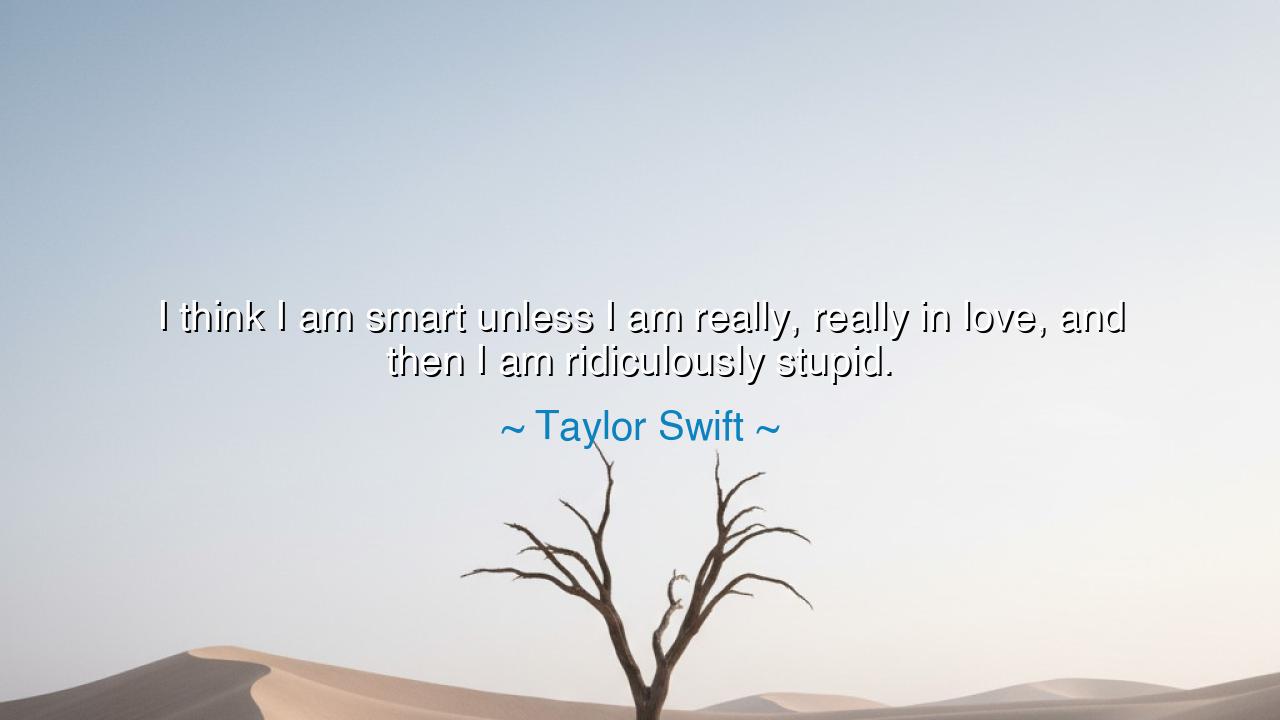
I think I am smart unless I am really, really in love, and then I
I think I am smart unless I am really, really in love, and then I am ridiculously stupid.






"I think I am smart unless I am really, really in love, and then I am ridiculously stupid." Thus confessed Taylor Swift, the modern poetess of the heart, whose songs weave together wit and vulnerability, wisdom and longing. Beneath the humor of this remark lies a truth as ancient as the first sigh of love—that intellect and emotion are rarely equal partners in the chambers of the heart. In these words, Swift gives voice to a universal paradox: that the very power which makes us feel most alive can also make us act most foolishly. Love, radiant and wild, has ever been the conqueror of reason. It makes sages stumble and fools seem wise.
The ancients understood this well. They said that Eros—the god of love—carries not a crown, but a bow, and that every heart struck by his arrow forgets its balance. For in love, the mind becomes a servant to feeling. The heart, once measured and cautious, leaps before it looks. Taylor Swift, though speaking in the language of her time, echoes this eternal wisdom: when love takes hold, intelligence yields. It is not that we become less capable of thought, but that reason itself bows before the overwhelming beauty of emotion. The clear-eyed thinker suddenly finds joy in uncertainty, pride in vulnerability, and purpose in another’s gaze.
This irony is not confined to poets or lovers of song. Consider the tale of Antony and Cleopatra, whose passion defied empire and logic alike. Antony was a soldier, a strategist, a man whose mind had conquered nations. Yet when love for Cleopatra burned within him, wisdom faltered. He abandoned armies for affection, and empires for a glance. To the world, his choices seemed folly; to his heart, they were destiny. Swift’s words carry this same recognition—that love’s intoxication can make the wise act as though bewitched, and that even the keenest mind may grow blind in the presence of desire.
Yet there is tenderness, not condemnation, in this truth. For to be “ridiculously stupid” in love is not wholly a curse—it is a reminder of our humanity. In those moments when love overtakes reason, we are stripped of pretense and armor. We become open, raw, vulnerable—and therefore real. The same heart that trembles in foolishness also glows with courage, daring to risk pain for the chance of joy. Swift, who has built her art upon the alchemy of heartbreak and healing, understands that every mistake in love is also a lesson, every foolish act a step toward wisdom.
But her words also whisper a caution: love may awaken our deepest beauty, yet it also tests our discernment. To love truly is not to abandon all reason, but to balance passion with clarity. The danger lies not in feeling deeply, but in losing oneself entirely to the tide. The ancients compared the heart to a ship—its sails filled with the wind of emotion, but its course guided by the rudder of reason. Without that guidance, the vessel drifts toward ruin. So too must the modern soul remember: it is noble to love, but wiser still to love with awareness.
Taylor Swift’s wisdom, though cloaked in wit, is born of experience. Through her songs and her life, she has learned that love exposes both our brilliance and our blindness. The same person who can command a stage or master a craft may falter in the presence of affection. This is not weakness—it is the price of sincerity. The heart that feels deeply will sometimes stumble. The key is not to stop loving, but to rise wiser after each fall. Every heartbreak refines the heart as fire refines gold, burning away illusion until only truth remains.
So, my listener, let this teaching settle in your heart: do not fear the foolishness of love, for it is part of being alive. But learn from it. When love blinds you, do not curse the darkness—light a candle of reflection. When your heart outruns your reason, let time and honesty guide it home. To love deeply and still think clearly is the rarest art, and one learned only through the dance of error and grace.
For in the end, Taylor Swift’s words remind us that the heart and the mind are not enemies, but travelers on the same path—one dreaming, the other discerning. When they learn to walk together, love becomes not foolishness, but wisdom made radiant. Love bravely, therefore—but carry your reason as a lantern, so that even in the madness of the heart, you may still find your way.






AAdministratorAdministrator
Welcome, honored guests. Please leave a comment, we will respond soon